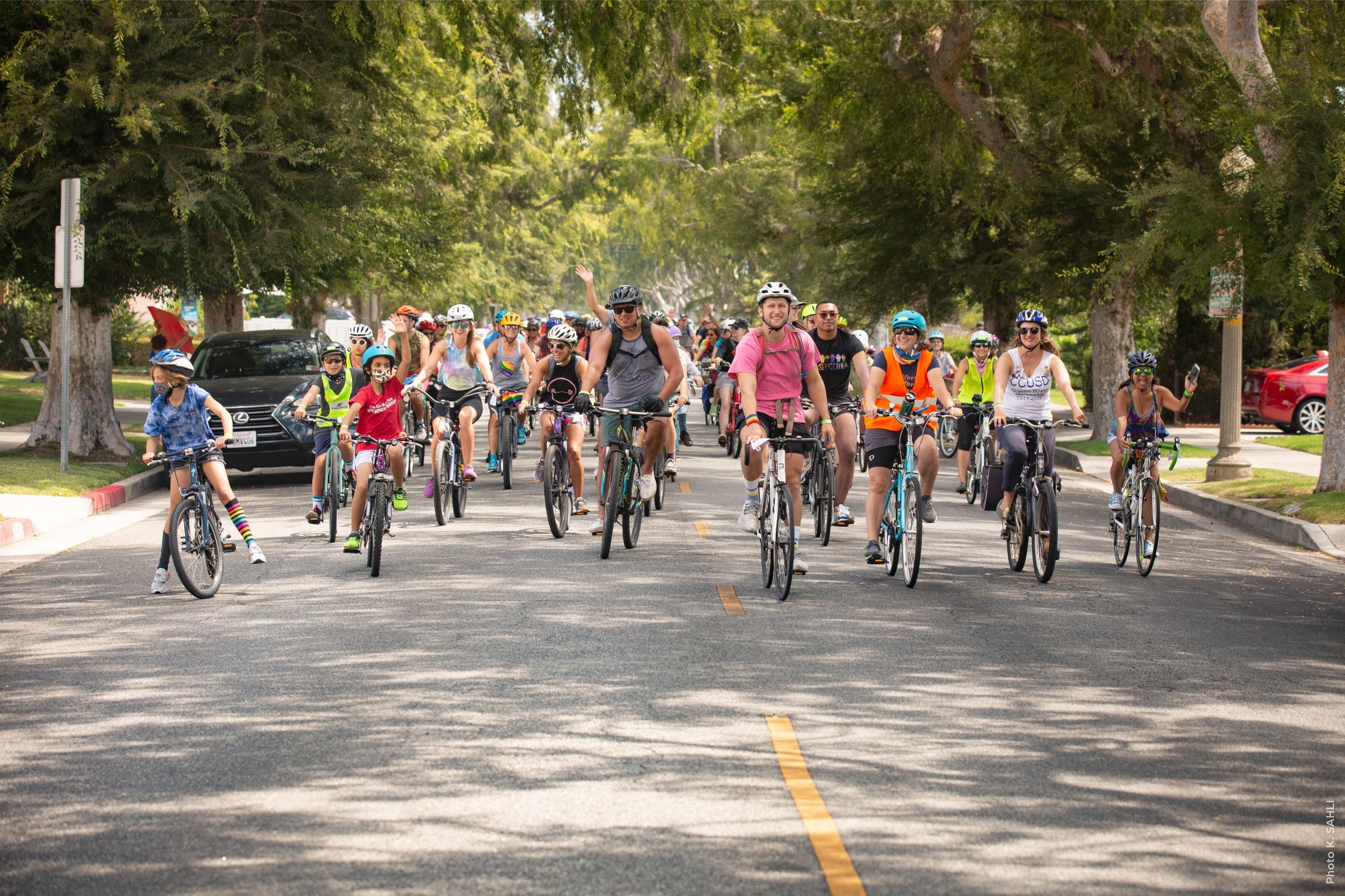
Create a Climate Resilient 15-Minute City
Climate change is a threat to our very existence that requires bold leadership and immediate, local solutions. The Intergovernmental Panel on Climate Change (IPCC) has sounded the alarm, emphasizing the urgency of local action to mitigate the most devastating effects of climate change. As we confront this existential challenge, Culver City has the opportunity to lead by example. By creating safe, accessible streets, expanding transit services, and supporting workers and sustainable small businesses, we can build a city that is both resilient to climate impacts and supports all its residents and stakeholders.
Ensure safe, accessible streets for all ages & abilities
Transportation, primarily from passenger vehicles, stands as the largest contributor to greenhouse gas production, accounting for 39% of all emissions statewide. In Culver City, this figure is even more staggering at 56%. But our dependence on cars isn't just a detriment to our environment—it also poses significant health and safety risks to our community. Car crashes remain the leading cause of death for children in L.A. County. Traffic congestion also consumes an entire week of our lives each year, costing our economy millions in lost productivity and leading to long-term negative impacts on our health and wellbeing. Moreover, the rising costs of car ownership, averaging about $12,000 a year, is an additional economic burden for low-income residents. We must address these challenges by creating safer, more accessible streets for everyone in our community, prioritizing children, seniors, disabled travelers, and other vulnerable road users.
Design and implement comprehensive safe routes to school and safe routes for seniors programs to increase safety and accessibility to child care programs, schools, senior centers, retirement facilities, parks, clinics, local businesses, grocery stores, our farmers market, dining establishments, and other amenities.
Create a connected, protected, bike network across Culver City.
Lower speed limits and invest in traffic calming measures on dangerous streets, particularly those near schools and on routes used frequently by seniors, leveraging state law (AB 43).
Follow in LA’s footsteps and reduce speed limits in school zones to 15 mph.
Increase walkability and ADA compliance by widening sidewalks and reducing impediments to pedestrian travel such as power boxes, light poles, etc. where feasible.
Reduce the primacy of cars and delivery vehicles over bikes, buses, and pedestrians on our public streets, crosswalks, and walkways.
Expand bicycle and scooter parking on major corridors and in business districts.
Explore the creation of a citywide parking & charging system for bikes, scooters and micromobility
Expand transit service & increase frequency
For a job-rich city like ours, efficient and expansive public transit networks are critical to curbing emissions, alleviating traffic congestion, and meeting the diverse needs of our community. The award-winning Culver City Bus transit service not only benefits our local community, but also serves as a regional asset for the entire Westside. With recent advancements in state law, we have a unique opportunity to enhance our transit infrastructure, create a network of bus priority lanes, and elevate the overall rider experience, ensuring fast and frequent public transit that is accessible to all.
Build a network of transit-only lanes to increase speed of service and allow buses to bypass traffic.
Strengthen bus-only lanes and protected bike lanes by enhancing street design and leveraging recent state laws, and use minor civil penalties to keep them clear of parked cars.
Increase transit service frequency, especially to dense, underserved communities such as Fox Hills.
Implement signal priority for popular bus routes, especially during peak hours.
Provide street trees and other shade, trash bins, seating, and wait time displays at every transit stop.
Attract and retain bus operators with good wages, ample benefits, professional development opportunities, and job supports.
Create a fare-free transit pilot program to measure impact on ridership, reliability, and usage.
Restore free fares for the Downtown Circulator, and explore adding a Circulator to Fox Hills.
Support the creation of an open streets program in which city residents and businesses could apply to restrict car traffic on certain streets for recreation and placemaking.
Boost sustainable small businesses and support justice for workers
With its thriving healthcare sector, vibrant restaurant and hospitality scene, and sizable footprint of tech and entertainment companies, Culver City owes much of its success to its workforce. As we advance towards a sustainable future, it's imperative we maintain our focus on prioritizing the well-being of our city's workers and recognizing small businesses for their commitment to sustainability.
Complete the amortization and shut down of the Culver City portion of the Inglewood Oil Field.
Establish and pass a living minimum wage to increase affordability and quality of life for Culver City’s workers and to enable more workers to live in Culver City, thereby reducing emissions and traffic caused by super-commuters.
Expand the Culver City Sustainability Business Certification Program which aids businesses in compliance with local and state environmental laws, provides increased cost-savings, and reduces their environmental footprint.
Increase investments in the Culver City Business Resource center to increase innovation and incentives for budding small businesses and entrepreneurs with targeted outreach to employee owned-business as well as to women, Black, Latine, indigenous, immigrant, and queer business owners.
Prioritize a clean, just transition from fossil fuel powered energy to solar, wind, and renewables.
Unlock a new revenue stream for the city by using incentives from the Inflation Reduction Act to build renewables like rooftop solar for city-owned buildings.
Implement parking maximums city-wide for all new developments to reduce emissions and reduce the land taken up by parking that could be used for housing.
Expand bicycle, scooter, and micromobility parking, and institute bicycle/micromobility parking requirements for new developments.
Explore developing an ‘accessory commercial unit’ program to encourage and legalize commerce within residential neighborhoods (e.g. Jackson Market & Deli and Jerry’s Market).
Work with Culver City staff to streamline the approval process for new businesses in Culver City, so businesses are not stuck in limbo paying rent for months before they are able to open.



